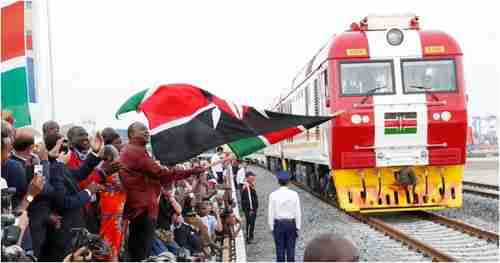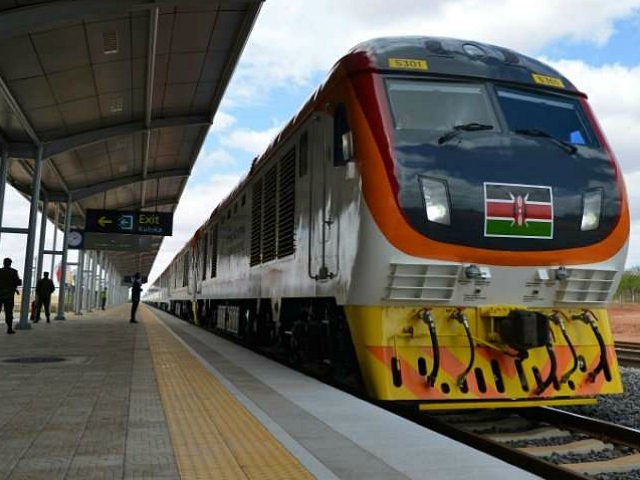This morning’s key headlines from GenerationalDynamics.com
- Kenya’s leaked BRI contract reveals shocking China debt trap details
- Leaked clauses in Kenya-China BRI contract
- Uganda’s auditor warns that Uganda may be in similar China debt trap as Kenya
- India pledges $1.4 billion to Maldives to help with China debt trap
Kenya’s leaked BRI contract reveals shocking China debt trap details

Celebrations at Kenya’s Standard Gauge Railway (SGR). (Railway Gazeti)
China has signed Belt and Road Initiative (BRI) contracts with dozens of countries with the requirement that the details be kept secret, even from the countries’ ministers or central banks.
It has always been clear that the reason why China demanded total secrecy was that these contracts are extremely favorable to China and are used for “debt trap diplomacy,” allowing China to take control of a country’s infrastructure when it is unable to make the loan payments.
The poster child for debt trap diplomacy is China’s seizure of control of the Port of Hambantota after Sri Lanka was unable to pay the onerous debt payments that China had demanded. China has already acquired or is about to acquire ports and other assets in several countries – Sri Lanka, Democratic Republic of Congo (DRC), Ghana, Zambia, Kenya – through its “debt trap diplomacy.” Several other countries, including Pakistan and the Maldives, are at risk. Malaysia is still at risk, as well.
Now, a partially leaked BRI contract between Kenya and China reveals details that are far more shocking and onerous than have been revealed or inferred so far. With Kenya’s debt repayments to China scheduled to triple this year, all of Kenya’s national assets are at risk unless public pressure forces China to relent.
The new headline revelation is that all Kenya’s assets, within Kenya or abroad, are now subject to Chinese seizure if Kenya cannot make its debt payments. Up until now, Kenyans had worried that its Port of Mombasa, which would be extremely valuable to China for use as a military base, was in danger of seizure by China. But the leaks reveal that any Kenyan asset can be seized.
The leaked document refers to the Standard Gauge Railway (SGR) project, a railway from Mombasa to Nairobi funded by two separate $1.6-billion loans from China. The debt was to be repaid from revenue from the SGR, but that has been far below the optimistic estimates made in 2014. Clause 5.5 of the “Preferential Buyer Credit Loan Agreement on the Mombasa-Nairobi SGR” says the following:
Neither the borrower (Kenya) nor any of its assets is entitled to any right of immunity on the grounds of sovereignty or otherwise from arbitration, suit, execution or any other legal process with respect to its obligations under this Agreement, as the case may be in any jurisdiction.
Strictly interpreted, this clause forfeits all of Kenya’s rights, sovereign or otherwise, to any Kenyan asset, whether the Port of Mombasa, another asset within Kenya, or a Kenyan asset abroad. None of the news reports I have seen provides a list of foreign assets that might be vulnerable, except to suggest that all of them are. According to legal experts, in case of default, China can take over many critical resources — anything from airports and natural resources to embassies abroad.
Leaked clauses in Kenya-China BRI contract
Other clauses of the leaked contract reveal the following:
- Kenya must keep the contract secret. Clause 17.7: “The borrower (Kenya) shall keep all the terms and conditions hereunder or in connection with this agreement strictly confidential. Without the prior written consent of the lender (China), the borrower shall not disclose any information hereunder or in connection with this agreement to any third party unless required by applicable law.”
- The agreement is governed by Chinese law. According to one Kenyan lawyer: “The agreement is being made in Kenya, the railway is built in Kenya and the assets they are talking about are in Kenya, so why is it being governed by the laws of China? Had there been more transparency or choices of who funds the railway then Kenya may have got a better deal.”
- Any disputes can be resolved only by a Chinese agency, the China International Economic and Trade Arbitration Commission (Cietac). According to the agreement, “The arbitration award shall be final and binding on both parties. The arbitration shall take place in Beijing.” In normal contracts, disputes are settled by a neutral and impartial arbitrator. For example, in 2017 Kenya signed a pipeline security commercial contract with Israel, and disputes will be submitted to an arbitrator in London.
- Kenya pays the China Road and Bridge Corporation (CRBC) $10 million per month to run the railway. As is usual in China’s BRI contracts, the Kenyans are not permitted to run their own railroad or to hire their own workers. This despite the fact that CRBC has been repeatedly accused of abusive behavior towards Kenyans, and of “neo-colonialism, racism, and blatant discrimination.” Kenya’s Auditor-General Edward Ouko has repeatedly violated Kenya’s laws by not releasing regular reports on payments to CRBC.
- Kenya is compelled to import goods, technology, and services from China. This is standard practice for China’s BRI deals. China loans a huge amount of money to a country like Kenya. Kenya must use the money to pay Chinese workers and buy goods, technology, and services from China. So all the money goes right back to China and benefits Chinese factories and workers, rather than Kenyan factories and workers. And yet, Kenya still has to repay the loan, which means that it is repaying the loan twice, or else have all its assets seized and confiscated by the Chinese.
- China is charging considerably more for the project than would be standard in other countries. This is a sign of corruption.
- If Kenya tries to pay off the loan with alternate funds (I assume this means a loan from another country), then China can refuse to accept that payment.
The agreement contains other clauses that protect China and almost guarantee that the loan will not be repaid, allowing China to seize Kenyan assets.
Kenya’s government has repeatedly promised to publicly release the contract but has always stalled, presumably because doing so would violate the contract with China and would also expose massive corruption and incompetence among Kenyan government officials.
Kenya’s government is promising to release the contract by the end of the week. Now that many of the clauses have already been publicly revealed, perhaps it might actually happen. The Nation (Kenya) and Mwakilishi (Kenya) and Tuko (Kenya)
Related Articles:
- China may seize Kenya’s Mombasa Port as debt repayments triple (03-Jan-2019)
- China’s railway contractor in Kenya accused of ‘neo-colonialism, racism and blatant discrimination’ (14-Jul-2018)
- African Cédric Bakambu joins China’s Sinobo Guoan Football Club (04-Mar-2018)
- Zambia denies defaulting on infrastructure loans from China (15-Sep-2018)
Uganda’s auditor warns that Uganda may be in similar China debt trap as Kenya
Uganda’s Auditor General John Muwanga is warning that Uganda may be subject to the same risk as Kenya. He points out that Uganda’s national debt had gone from $3.3 billion in June 2017 to $4.1 billion in June 2018. Furthermore, according to Muwanga, Uganda’s contracts with China contain exactly the same clauses as Kenya’s contracts. According to Muwanga:
These conditions include waiver of sovereign immunity by government over all its properties and itself from enforcement of any form of judgment, adoption of foreign laws in any proceedings to enforce agreements, requiring government to pay all legal fees and insurance premiums on behalf of the creditor.
However, Uganda’s Minister of Finance Matia Kasaija dismissed the Auditor General’s report: “I am not worried about China taking our assets. They can do it elsewhere, I don’t know, but not here. I don’t think it will ever happen.”
India pledges $1.4 billion to Maldives to help with China debt trap
India will provide the Maldives with a $1.4 billion credit line after the new president Ibrahim Mohamed Solih visited India’s Prime Minister Narendra Modi in New Delhi last month. The credit line will permit the Maldives to avoid default on payments on its debt to China, estimated to be between $1.5 billion and $3.2 billion.
Solih shocked the Maldives by winning the presidential election on September 23 by unexpectedly defeating the incumbent Abdulla Yameen Abdul Gayoom. Yameen had close relations with China and had signed several BRI infrastructure contracts with China that place the Maldives into a great deal of debt.
When Solih took office, he discovered that it was almost impossible to learn the details of the contracts with China. ( “24-Nov-18 World View — Maldives can’t determine how much money it owes to China”)
Solih vowed that he would find out exactly what was in the deals with China and, at the time, I expressed the hope that Solih would make the China deal public so that, for the first time, we could see all the details in one of China’s BRI deals.
Unfortunately, that has not happened yet, though I am still hoping. In an interview last week, Solih said:
Our government is still reviewing the extent of the debt incurred under the previous government. No doubt, the debt situation has put us in an extremely challenging situation. A vast number of infrastructural projects have been undertaken and we are in the process of reviewing the terms of these agreements.
Perhaps the leaking of the Kenya deal will make it possible for Solih to release the details of the Maldives’ deal.
The Maldives islands occupy a major strategic position in the Indian Ocean. India’s promise of $1.4 billion in aid to the Maldives has the geopolitical effect of moving Maldives away from China and closer to India. India Times and Maldives Times and Diplomat
Related Articles:
- Maldives can’t determine how much money it owes to China (24-Nov-2018)
- China and India compete for influence in Sri Lanka and Maldives constitutional crises (10-Nov-2018)
- Maldives crisis pits India vs China in the Indian Ocean (07-Feb-2018)
- Maldives in crisis as China-backed incumbent president Yameen loses election (24-Sep-2018)
KEYS: Generational Dynamics, Kenya, Standard Gauge Railway, SGR, China, Belt and Road Initiative, BRI, debt trap diplomacy, Mombasa port, Sri Lanka, Hambantota port, Democratic Republic of Congo, DRC, Ghana, Zambia, Pakistan, China International Economic and Trade Arbitration Commission, Cietac, China Road and Bridge Corporation, CRBC, Edward Ouko, Uganda, John Muwanga, Matia Kasaija, Maldives, Abdulla Yameen Abdul Gayoom, Ibrahim Mohamed Solih, India, Narendra Modi
Permanent web link to this article
Receive daily World View columns by e-mail

COMMENTS
Please let us know if you're having issues with commenting.